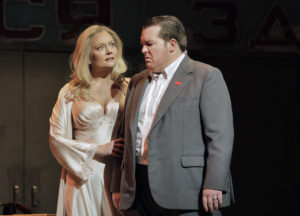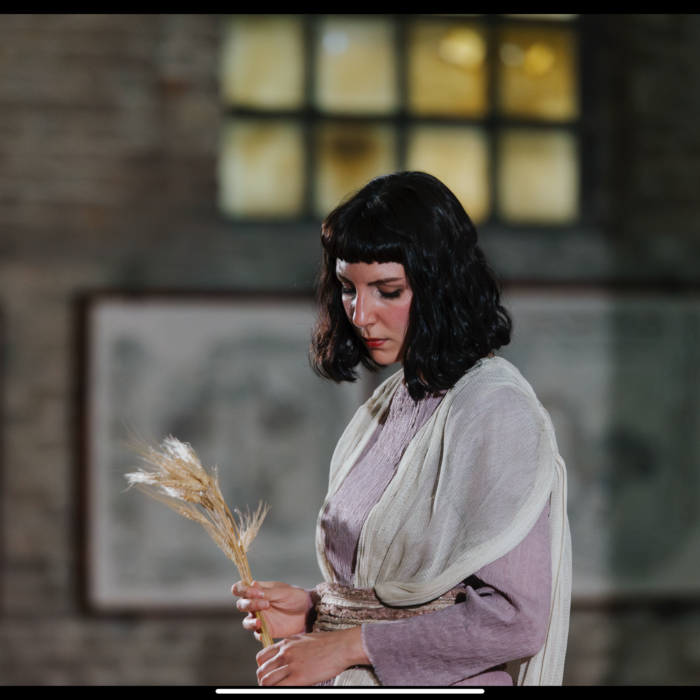
Bard SummerScape Festival 2017 Review – Dimitrij: A Flawed Production Makes Compelling Case For Dvořák’s Rarely Heard Sixth Opera
By Francisco SalazarLet me start off by saying “Dimitrij” is not Dvořák’s melodic masterpiece nor is it the most important work by the composer. But Dvořák’s sixth opera is a compelling grand opera that deserves more exposure and more productions. In sum, while listening to this unique opera, one can certainly hear hints of the dramatic prowess Dvořák would eventually utilize to create his greatest operatic masterpiece “Rusalka.”
Attending the second performance of the Bard Summerscape Festival, it was clear that this opera is a challenge and at times difficult to stage due to its immense choral music, the necessity for two sopranos, a mezzo, a bass, a baritone and a tenor who can pull off three hours of singing without ever feeling strained. And Bard was able to pull off the feat, albeit with some minor issues that did not affect the overall performance.
The Synopsis
For those not familiar with the work, “Dimitrij” is seen as a sequel to Boris Godunov. The opera picks up after the death of Boris and the Russian people are split between the followers of the Godunov family led by Shuisky, while others support Dmitrij, the assumed son of Ivan the Terrible and husband to the Polish Marina of the Sandomir family. Despite knowing that Dimitrij might not be her son, Marfa recognizes him as such in order to exact revenge on her old enemies. The opera unfolds as Dimitrij breaks up altercations between Poles and Russians and rescues Godunov’s daughter Xenia, with whom he falls in love. That immediately creates tensions between Dimitrij and his wife leading to the discovery of his origins.
The Music
For those expecting the lush melodies of “Rusalka” and the memorable arias Dvořák wrote for that work, there will be some disappointment. Dvořák focuses more on the choral music, creating grand scenes that are spectacular in all of its definitions. There is immense attention paid to the chorus going from immense outcries to lush music to dances and joyful music. And while the principals get some melodic passages, Dvořák concentrates on building the drama in ways reminiscent of Wagner. Essentially, the melodic line is always coming at the climax of the scene and the music always emphasizing the text to great impact.
Each principal also gets a unique quality. Dimitrij’s music is impassioned and filled with vigor while Marina’s has a masculine touch with March-like rhythms accompanying her. Xenia’s music, on the other hand, is very romantic, always sticking to the melodic and fragile qualities of the character.
And while “Dimitrij” is an unforgiving three-plus hours, it is not the longest of works and it sure doesn’t feel like it as Dvořák always keeps the music moving. Most importantly the music is exhilarating and addictive.
The Chorus and Orchestra
Before I move onto the main singers, I have to commend the chorus. Bard has put together an ensemble that radiates with energy and vigor. You can criticize the stock gestures at times or even the hammy choreography but director Anne Bogart and chorus master James Bagwell allowed them to shine. Bogart masterfully found ways to place them in each scene to create evocative images like the argument between the Poles and the Russians and the final still frame. It allowed them to play as characters in the action and each one of them was uniquely dressed. Additionally, many of the chorus members created captivating gestures that allowed some of them to come to the fore and bring the audience’s attention to them.
It was also magical to hear how each time the chorus sang, the music was taken to a new level with the auditorium being filled with lush sounds. Among the highlights were the joyful Mazurka/drinking song that saw the brightness in their voices shine. And the other highlight was the finale. Singing with power, the ensemble continued to grow in volume as it demanded the truth about Dimitrij. They surrounded Marfa creating a claustrophobic space and eventually sang with a fortissimo volume before dying down as they mourned the death of the false Dimitrij. The final notes floated in sublime fashion.
Leon Botstein, who has advocated for performing rare gems, conducted with precision, the orchestral playing quite remarkable for its clarity and drive.
Dimitrij
In the title role, Clay Hilley is asked to perform for three hours straight in music that tests a tenor’s stamina. In this case, the 35-year-old tenor did just that without ever sounding strained. From the beginning of the opera, Hilley was asked to scale the highest tessitura during his duet with Marfa, singing with intensity and beaming over the giant orchestra. Then in his first duet with Marina in Act two, Hilley took a lighter touch as he tried to persuade his wife to become Russian. However, Marina’s defiance immediately brought out Hilley’s forceful tenor that rang through the hall.
The highlight of Hilley’s performance came at the end of Act two and the beginning of Act Three. In his first duet with Xenia, Hilley brought delicacy to his voice as he approached the young girl played by Olga Tolkmit. Each line was connected with suave phrasing and the tone becoming even more impassioned joining with Tolkmit’s to create a rousing conclusion. In his Act three aria “Viděl jsem ji, Xenii jsem zřel,” Hilley’s timbre brightened. He sang with a smooth legato and each time he repeated the words “Xenii,” the voice crescendoed to a forte, illuminating his passion for Xenia.
His subsequent duet with Marina once again showed his forceful timbre as it continued to erupt with anger at his wife. While his disdain for Marina needed to be seen in a bit more physical movements that were ultimately lacking, Hilley’s voice expressed the rage through staccato phrasing and emphasis on the consonants in the text. His high notes were also even more accentuated and took on more heft.
During his Act four duet with Xenia, Hilley immediately went for the fortissimo sound emphasizing his desperation for being with her. The passion in his vocal color grew increasingly as he realized he could lose her. By the end of the end of the opera Hilley’s voice still sounded fresh as he continued to sing with authority. Even as he admitted to being an imposter, Hilley gave his timbre an imposing character, making his sacrifice an even more potent moment in the opera.
If there was a flaw to Hilley’s performance it was in his acting. He didn’t move much and when he did it looked forced. One such example was his aggressive pushes towards Marina in his Act three duet. However, Hilley has something that very few singers have nowadays and that is he can act with his voice and can captivate audiences once he begins.
For opera houses saying there are no dramatic tenors, look no further as Clay Hilley is a tenor on the rise who needs attention.
Marina
As Marina, Melissa Citro brought an opulent voice to the manipulative character. Citro’s character is the Lady Macbeth of the opera as she manipulates the situation with every movement. While she does not sing a word in Act one, her imposing stage presence created anticipation for her Act two duet and aria. Citro moved about in a snake-like fashion, eyeing each person with a devilish stare. It was brilliant stage direction and one immediately knew what this character was all about.
And in Act two Citro delivered on her promise as she sang her duet with sumptuous full voice. As Hilley’s Dimitrij tried to convince her to become Russian with his suave line, Citro’s response had a sarcastic full tone. While Dimitrij’s lines were clearly rich and full, Marina’s were jagged and even more masculine. Citro pulled off the devilish coloratura lines without effort and clearly in control. At the end of the duet, as her lines started pulling towards the lyric, she maintained a full sound, never going toward the subtle lines of Dimitrij, her sense of power all the more present.
If the parallels with Lady Macbeth couldn’t be any more clear, Dvořák added a drinking song for Marina. In this tricky passage, the soprano is asked to pull off trills and scale the highest parts of the dramatic soprano tessitura. Citro, while at some points sounding strained at the top, nevertheless dazzled with her flexibility.
But Citro’s vocal high point came in her Act three duet with Dimitrij. While she had already shown a manipulative and authoritative woman, Citro’s portrayal brought on more complex levels. Vocally she showed the torment and madness in this woman. Starting the duet with a quiet piano, the sound continuously grew in power and strength and during her account of Dimitrij’s origin, Citro followed Dvořák’s constant tempi and rhythmic changes. Starting with a lyric line and a mezzo piano, the voice followed with forte outcries emphasizing her torment. Then in the recitative lines, there was almost a spoken quality to the voice and in the march-like passages, she gave a breathy quality before returning to a lyric line. And at the end, when she is rejected by her husband, the power of the voice took on a dramatic power showing her anger and torment, making it unpredictable as to what was next for the character.
However, the highest point of her riveting singing was also her lowest point. She was undeniably effective during her first entrance as she lurked in the background. But her subsequent Act two and three appearances left much to be desired in the acting department. The moment she walked on stage for Act two with a long white mermaid ball gown, Citro seemed uncomfortable and moved about with excessive caution. And when asked to join in on the drinking song, there seemed to be hesitation physically. In her Act three duet, she looked as if she was going through the motions, her physicality not matching the vocal commitment. While her voice showed an explosion of sound, desperation and torment, her motion was stale and it threatened to take away from her effective vocal artistry. Even when Dimitrij threw her to the sofa, Citro seemed to fall carefully. What could have been one of the most riveting and dramatically compelling of scenes, fell flat. One almost wished they would have stood still.
Still, with a voice like hers and some minor acting adjustments, Citro is a major dramatic soprano to look forward to.
Marfa, Xenia, Jov & Shiusky
In the role of Xenia, Olga Tolkmit gave a delicate touch to the fragile character suffering for her father Boris’ death. The pain of loss was palpable from the start as Tolkmit sang her opening lines with a lush and sweet tone. In her first duet with Dimitrij, she began her phrasing quietly but as the intensity of the duet continued, her vocal power started to come through. The delicacy and sweetness turned strong and bright.
But in Act three and four when she realizes she has been betrayed, the soprano’s timbre returned to melancholic and introverted. The confused state of the character made a return and in her Act four aria “Mně zdálo se, že smrt bledá bledá sáhla na mne,” Tolkmit brought a tenderness yet a lush sound that brought out the fragile emotional state. In the last duet with Dimitrij, having already made up her mind to forget him, the impassioned tone returned as her full vocal power beamed through the auditorium.
Nora Sourouzian may have looked a tad young for the demanding role of Marfa but her vocal prowess proved adept for the role. While the character only really gets two scenes of note, she relished them. In her first scene, her singing soared of joy as she recognized Dimitrij as her son. Sourouzian’s voice had great strength through the ensemble. In Act four when she is asked to swear upon the cross about whether or Dimitrij is her son, Sourouzian’s timbre took a darker complexion as she scaled her highest mezzo range into a visceral cry.
In the role of Shiusky, Levi Hernandez delivered strength and authority while Peixin Chen gave his Jov, Patriarch nobility through his booming bass. Joseph Baron effectively moved about the stage fully capturing his character Basmanov.
The production
Anne Bogart’s has updated the story during the fall of the Berlin Wall and the collapse of the Soviet Union. The space was painted in peeling blue paint with wooden floors that is transformed into a crypt, a modern hotel room, and a religious shrine.
Bogart effectively used the stage to create evocative light effects through the use of a curtain. During the Act two scene with Xenia and Dimitrij, when the curtain is closed to reveal a crypt, the lighting turns to dark shadows, an effect very evocative of Picasso’s melancholic blue period. In Act three, when the curtain is once again closed for Marina and Dimitrij’s confrontation, the set had a film noir aesthetic, delineating the confrontation between the title character and the opera’s femme fatale. When Marina tore down the curtain, light came through foreshadowing the conclusion of the opera.
But it wasn’t all perfect. While Bogart knew how to use her space, the biggest flaw came in the choreography of two dance pieces. The opening of Act two is an overture in the style of a Slavic dance and in this production two dancers bounced around with no evident direction, looking stolid and inflexible. And then in the Mazurka/drinking song that Marina sings, the chorus looked out of its depth dancing in circles, again with no seeming sense of direction. Perhaps having more dancers fill the space to accompany the chorus might have mitigated the effect, giving it a greater sense of cohesion.
Despite these flaws, Bard Summerscape put together a solid cast and production that makes a good case for this opera to be brought to larger houses. For years audiences have only really associated the great Czech composer with one opera – “Rusalka.” “Dimitrij” should get some consideration as well.


